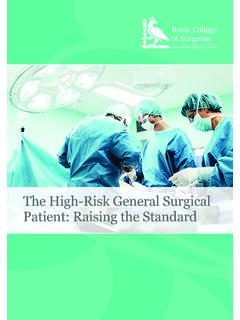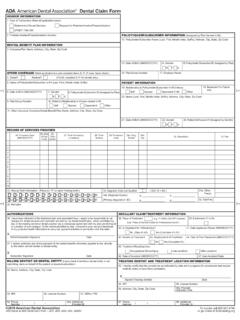Transcription of Antimicrobial Prescribing in Dentistry for General Dental ...
1 Antimicrobial Prescribing in Dentistry Good Practice Guidelines3rd EditionAntimicrobial Prescribing for General Dental Practitionersupdated 2016 Antimicrobial Prescribing in DentistryFaculty of General Dental Practice (UK) Faculty of Dental SurgeryiAntimicrobial Prescribing in Dentistry Good Practice Guidelines3rd EditionEDITOR: NIKOLAUS O PALMERBDS MFGDP(UK) PhD FDS RCSEng FFGDP(UK)Faculty of General Dental Practice (UK) Faculty of Dental SurgeryiiRoyal College of Surgeons of England35-43 Lincoln s Inn Fields London WC2A 3 PERegistered charity no. 212808 Faculty of General Dental Practice (UK) 2020 All rights reserved. No part of this publication may be reproduced, stored in a retrieval system, or transmitted, in any form or by any means, without the prior permission in writing of the Faculty of General Dental Practice UK (FGDK[UK]), or as expressly permitted by law or by licence. Enquiries concerning the reproduction outside the scope of the above should be sent to the Faculty of General Dental Practice UK at First edition published 2000 Adult Antimicrobial Prescribing in Primary Dental Care for General Dental PractitionersSecond edition published 2012, updated 2012 Antimicrobial Prescribing for General Dental Practitioners Third edition published 2020 Antimicrobial Prescribing in Dentistry : Good Practice GuidelinesISBN: 978-1-8381964-2-4e-ISBN: 978-1-8381964-3-1 Please cite this work as: Palmer, N.
2 (Ed). Antimicrobial Prescribing in Dentistry : Good Practice Guidelines. 3rd Edition. London, UK: Faculty of General Dental Practice (UK) and Faculty of Dental surgery ; every effort has been made to ensure the accuracy of the information contained in this publication, no guarantee can be given that all errors and omissions have been excluded. The Faculty of General Dental Practice UK and the Faculty of Dental surgery do not accept responsibility or legal liability for any errors in the text, the misuse or misapplication of material in this work, or loss occasioned to any person acting or refraining from action as a result of material in this publication. Design & print: Smart Monkey Design Prescribing in DentistryFaculty of General Dental Practice (UK) Faculty of Dental SurgeryiiiCONTENTSFOREWORD viCONTRIBUTING AUTHORS viii1 INTRODUCTION 1 Scope of the guidance 3 Development and presentation of the guidance 42 PRESCRIPTION WRITING 73 ASSESSMENT OF THE PATIENT 114 ACUTE DENTO-ALVEOLAR INFECTIONS 13 Acute periapical infections 13 Severe rapidly spreading dento-facial abscesses.
3 Cellulitis and Ludwig s angina 16 Antimicrobial drugs of choice 175 CHRONIC Dental INFECTIONS 27 Chronic dento-alveolar infections 27 Osteomyelitis 28 Medication related osteonecrosis of the jaw (MRONJ) 30 Osteoradionecrosis (ORN) 31 Antimicrobial drug of choice 326 PERICORONITIS 33 Antimicrobial drugs of choice 357 DRY SOCKET 398 ACUTE SINUSITIS 41 Antimicrobial Prescribing in DentistryAntimicrobial Prescribing in DentistryFaculty of General Dental Practice (UK) Faculty of Dental Surgeryiv9 BACTERIAL SIALADENITIS 43 Antimicrobial regimens 4410 PERIODONTAL DISEASES 49 Gingivitis 49 Necrotising periodontal diseases 49 Periodontitis 51 Periodontal abscess 58 Peri-implant disease 5811 ENDODONTIC THERAPY 65 Acute pulpitis 65 Acute and chronic periapical infections 66 Regenerative endodontic procedures (REP)
4 67 Tooth avulsion 67 Peri-radicular surgery 6812 Antimicrobial PROPHYLAXIS HEALTHY PATIENTS 71 Minor oral surgery 71 maxillofacial surgery 78 Reimplantation of teeth 8113 Antimicrobial PROPHYLAXIS MEDICALLY COMPROMISED PATIENTS 87 Cardiac disease 87 Total joint replacements 88 Miscellaneous prosthetic implants 89 Renal dialysis 89 Intravenous access devices 90 Immunocompromised patients 91 Prophylactic Antimicrobial regimens 99 CONTENTSA ntimicrobial Prescribing in DentistryFaculty of General Dental Practice (UK) Faculty of Dental Surgeryv14 VIRAL INFECTIONS 101 Primary herpetic gingivostomatitis 101 Secondary (recurrent) herpes simplex infections (HSV-1) 103 Orofacial varicella zoster infections 10415 FUNGAL INFECTIONS 109 oral candidosis 109 Chronic mucocutaneous candidosis (CMC) 120 APPENDIX 1: GUIDANCE DEVELOPMENT 121 Background 121 Methodology 121 Peer review 123 Consultation 123 Review and updating 124 APPENDIX 2: THE GUIDANCE DEVELOPMENT GROUP (GDG) 125 Membership of the GDG 125 Conflicts of interest 126 APPENDIX 3.
5 Antimicrobial STEWARDSHIP RESOURCES 127 CONTENTSA ntimicrobial Prescribing in DentistryFaculty of General Dental Practice (UK) Faculty of Dental SurgeryviFOREWORDA core function of both the Faculty of General Dental Practice (UK) (FGDP[UK]) and the Faculty of Dental surgery (FDS) of the Royal College of Surgeons of England is to raise the standards of care delivered to patients, through education of the Dental profession and the provision of evidence-based guidance. FGDP(UK) originally published guidance on Antimicrobial Prescribing for General Dental practitioners in 2000. A second edition was published in 2012 which has since been updated to reflect relevant changes in the field. We are delighted that a third edition has been developed as a collaborative project in partnership with FDS, and that the new edition encompasses guidelines for Dentistry rather than simply General Dental dentists, antimicrobials can be an important adjunctive therapy within our armamentarium for treating oral infection.
6 There are clear benefits for patients when prescribed appropriately, but there are also risks, which is why responsible and judicious Prescribing is extremely important. In addition to side effects and adverse reactions, increasing focus has been placed on the potential impact of Antimicrobial resistance. The Dental profession has worked assiduously to highlight the importance of Antimicrobial stewardship and to promote responsible Prescribing . Antimicrobials should only be prescribed when there is a strong clinical indication to do so, and the provision of clear guidance is an important resource to support dentists to prescribe appropriately and responsibly. This third edition of Antimicrobial Prescribing in Dentistry : Good Practice Guidelines provides such a resource, and will undoubtedly continue to be a key reference document for the Dental team. Antimicrobial Prescribing in DentistryFaculty of General Dental Practice (UK) Faculty of Dental SurgeryviiWe are extremely grateful to the various contributors who have spent considerable time and effort ensuring that this document is informative, accessible and highly relevant to all members of the Dental team.
7 In particular, we would like to acknowledge and thank Dr Nikolaus Palmer for his significant contribution as Chair of the Guidance Development MillsDean of the Faculty of General Dental Practice (UK)Trustee, College of General DentistryMatthew GarrettDean of the Faculty of Dental surgery , Royal College of Surgeons of EnglandAntimicrobial Prescribing in DentistryFaculty of General Dental Practice (UK) Faculty of Dental SurgeryviiiCONTRIBUTING AUTHORSN ikolaus PalmerGeneral Dental Practitioner, Clinical Adviser in Dental Education, Research Fellow, Health Education England North West Noha SeoudiSenior Lecturer, Specialist in Clinical oral Microbiology, Institute of Dentistry , Queen Mary University of LondonMark IdeReader in Periodontology, Hon Consultant in Restorative Dentistry , Kings College LondonChristine RandallPharmacist, Assistant Director, North West Medicines Information and National Dental Medicines Information ServiceLaura HylandConsultant in Special Care Dentistry , Birmingham Community Healthcare NHS Foundation Trust Amy PatrickRegistrar in oral surgery , Eastman Dental Hospital, University College London Hospital and Speciality Doctor Paediatrics, East Surrey HospitalAntimicrobial Prescribing in DentistryFaculty of General Dental Practice (UK)
8 Faculty of Dental Surgery1 The benefits of Prescribing antimicrobials to treat or prevent infections are limited by a number of problems associated with their use, side effects, toxicity, allergic reactions and importantly, the development of resistant strains of the last few decades, Antimicrobial resistance (AMR) has become a worldwide problem and constitutes a major threat to public AMR has increased as a result of widespread use of antimicrobials providing greater opportunity for bacteria to exchange genetic material, allowing resistant genes to spread between bacterial populations and rendering antimicrobials ineffective for their intended use. The inappropriate Prescribing of antimicrobials by the healthcare professions is a major concern to be addressed, especially as fewer and fewer new antimicrobials are being Registered dentists, doctors and non-medical prescribers can legally prescribe from the whole of the British National Formulary (BNF), but dentists treating NHS patients are restricted to Prescribing antimicrobials included on the Secretaries of State list published in the Dentists should not prescribe medicines other than to meet the identified Dental needs of patients.
9 They must make an appropriate assessment of the patient s condition, prescribe within their experience and competence, and keep accurate records of the It is a legal and regulatory requirement that dentists must involve patients in the decision-making process. This requires acknowledgement of the patients views about their condition and any proposed ,7 In the context of these guidelines, clear information including all the harms and benefits, must be provided to the patient where options may involve Antimicrobial Prescribing . INTRODUCTION1 Antimicrobial Prescribing in DentistryFaculty of General Dental Practice (UK) Faculty of Dental Surgery2 Primary care NHS dentists in England prescribe of all Antimicrobial prescription items in the whole of NHS primary The number of prescription items for antimicrobials provided by private Dental care practitioners and secondary care dentists is unknown. It is estimated that in total, dentists prescribe 10% of all antimicrobials prescribed in England, and there is evidence of inappropriate use.
10 9-12 This guidance has been developed to promote judicious Antimicrobial Prescribing and Antimicrobial stewardship within Dentistry . Antimicrobial stewardship has been defined broadly as a coherent set of actions to promote responsible use of This necessitates organisational or healthcare-wide systems to promote and monitor responsible and appropriate use of antimicrobials to preserve their future or inappropriate use of antimicrobials include: Prescribing in the absence of an infection or where local measures will suffice Prescribing prophylactically when not indicated An incorrect dose or too long or short duration An unnecessarily broad spectrum or narrow spectrum Antimicrobial or wrong Antimicrobial for the microbiology of a specific infection Treatment not adjusted when culture data is available Use of IV when oral route can be used Choosing an incorrect Antimicrobial for a patient with a known allergyAntimicrobial stewardship is about safe and effective use.





